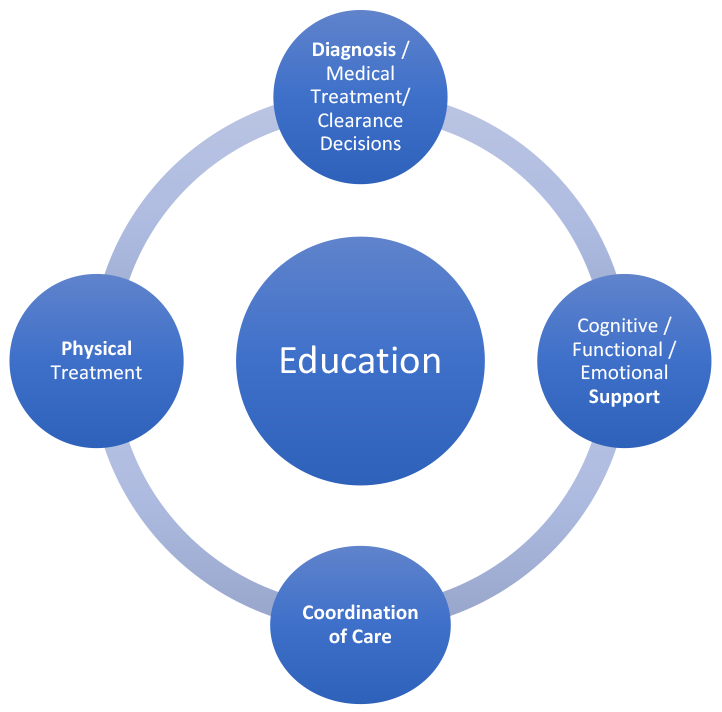Core Services/Functions
Core services/functions should be available in a concussion clinic or within a network of post-concussion care providers. Current evidence suggests that post-concussion care requires access to or capacity to integrate interdisciplinary care based on the constellation of symptom presentation (physical, affect, and cognition).
Currently in Ontario post-concussion services are provided within different funding and service models, including research-based clinics, sites with a specific mandate, or clinics involving a mix of publicly- and privately-funded services within a single structure or network of providers with additional capacity for external referrals. There is no known entirely publically-funded concussion clinic that provides the full breadth of interdisciplinary service.
This landscape of variable models of funding has been accounted for in this model of service provision.
The core functions required to manage post-concussion symptoms include:
- provision of education;
- diagnosis and access to medical services;
- physical treatment options;
- cognitive evaluation and treatment;
- evaluation and treatment of emotional conditions;
- functional integration; and
- co-ordination of care.
The diagram below shows how these functions can be grouped together and provides some examples of symptoms that can be treated within each category. Core functions of concussion clinics are defined rather than stipulating specific regulated healthcare disciplines that must be present.
Concussion Clinic/Services: Core Functions and Management
Every clinic/network of providers must be able to provide 5 key functions that involves at least three (3) different healthcare provider disciplines. Note that any of these functions must be performed by only those professionals regulated to perform them within their scopes of practice. See other sections for details on the eligible healthcare professionals.
- Diagnosis/Medical Treatment and Clearance Decisions
- Physical Treatment: Treatment of headache, balance problems, vision, nausea, musculoskeletal problems, sleep, etc.
- Cognitive, Functional and Emotional Support: Return to living support (school, work, play, emotional, and social communication), therapy (cognitive-communication, psychological, psychiatric) and management strategies (pacing, compensatory).
- Coordination of Care: Can be done by any of the above or another person (clinical or administrative); managing clinic appointments and external referrals, liaison with school/work/play settings and ensuring communication back to Family Physician.
- Education is at the foundation of clinic functions and should be provided at various points throughout service delivery to patients and family. The content should address details of the concussive injury: symptoms, course of recovery, current evidence based management strategies. Some repetition of content is expected.

Key Messages
- Core functions of Concussion Clinics are defined rather than stipulating specific regulated healthcare disciplines that must be present.
- Each function can be performed by more than one regulated health care provider health operating within their scopes of practice. Each regulated healthcare provider brings their own unique contribution
